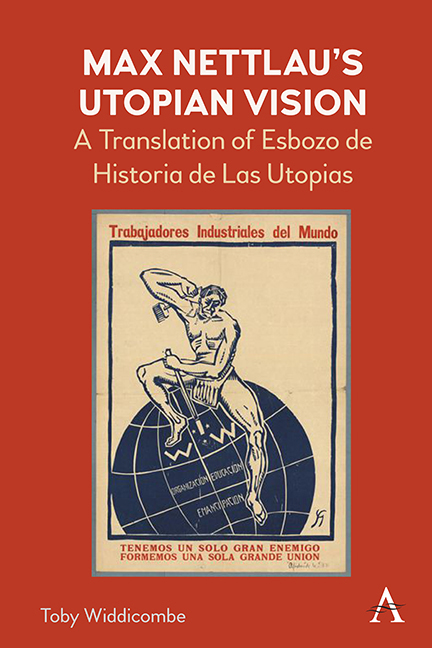Book contents
- Frontmatter
- Dedication
- Contents
- Preface
- Acknowledgments
- Introduction
- Outline of the History of Utopias
- 1 Definition
- 2 The Classical and Medieval Ages
- 3 The Renaissance and Neo-Classical Periods
- 4 The Nineteenth Century (to 1888)
- 5 1888 to the Twentieth Century
- 6 The Twentieth Century: 1900–1925
- Notes
- Appendix A Select Nettlau Bibliography
- Appendix B An Annotated Gazetteer of Nettlau’s Utopians
- Appendix C List of Intentional Communities in Esbozo
- Appendix D List of Utopian Newspapers and Journals in Esbozo
- Bibliography
- Index
4 - The Nineteenth Century (to 1888)
Published online by Cambridge University Press: 18 November 2023
- Frontmatter
- Dedication
- Contents
- Preface
- Acknowledgments
- Introduction
- Outline of the History of Utopias
- 1 Definition
- 2 The Classical and Medieval Ages
- 3 The Renaissance and Neo-Classical Periods
- 4 The Nineteenth Century (to 1888)
- 5 1888 to the Twentieth Century
- 6 The Twentieth Century: 1900–1925
- Notes
- Appendix A Select Nettlau Bibliography
- Appendix B An Annotated Gazetteer of Nettlau’s Utopians
- Appendix C List of Intentional Communities in Esbozo
- Appendix D List of Utopian Newspapers and Journals in Esbozo
- Bibliography
- Index
Summary
What produced a lengthy eclipse in utopian writing was the fact that public life after the end of the eighteenth century was largely open. This openness offered a more direct means of propagating ideas than the literary platform offered by utopian thinking. In England, at least at first sight, there was an intense political life: pamphlets and newspapers, discourses and associations. In France, the year 1789 saw the entire bourgeoisie and large sections of the citizenry enter into public life, which until that time had been reserved for an elite. Assemblies, clubs, newspapers, pamphlets provided a direct means by which thousands of diverse ideas could be heard. Things changed from day to day so there was no time [for utopian thinking], even though much time was wasted in high-sounding discussions, in allegorical phraseology, in imitation of the ancients. However, these were novelties, and the public was avid for them; they had had enough of a century of a literature of allusions, of cleverly hidden satire. And then, too, there was this: the public was fascinated by constitutions and legislation, and were distrustful of social questions since there was still a lack of material goods. There was poverty, hunger, famine, speculation, and hoarding, and in this situation and with a strengthened, better-off bourgeoisie, nothing less than true social reform was looked for. The State used violence—in the form of the Draconian dictatorship of the committees—to intervene, but the State was as horrified by the speculators as by the hungry, by the hoarders as by the agrarian law. And if they cut the heads off the entire class of traditional farmers, they would also have to cut off the head of Babeuf, the only socialist who remained standing and did not hide his opinions behind a vague idea of an ultra-patriotism for everyone, what could be called “howling with the wolves.”
The tender flower of utopia could not flourish under these conditions; there was only a cynical utopianism that confirmed the triumph of the strictly antisocial bourgeoisie. That sort of utopianism is seen in that massive two-volume work by Pierre-Paul Le Mercier de la Rivière, L’heureuse nation, ou relations de gouvernement des Féliciens; peuple souverainement libre sous l’empire absolu de seês loix [The Happy Nation, or Governmental Relations under the Feliciens—A People Free and Sovereign under the Absolute Rule of Law] (1792).
- Type
- Chapter
- Information
- Max Nettlau's Utopian VisionA Translation of Esbozo de Historia de Las Utopias, pp. 27 - 42Publisher: Anthem PressPrint publication year: 2023



